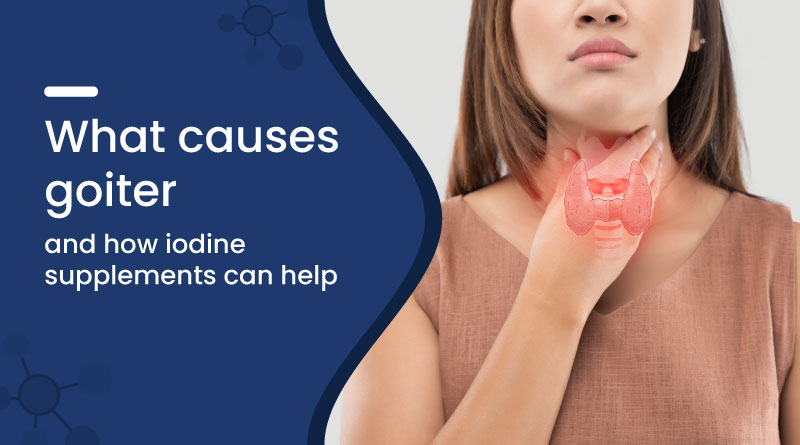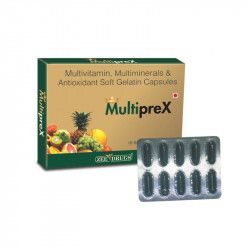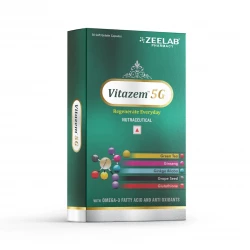What Causes Goiter? Role of Iodine Supplements in Treatment


A goiter is a swollen thyroid gland seen as a lump at the neck's base. The primary cause of goiter is iodine deficiency, but it can also result from thyroid disorders, medications, or autoimmune conditions. This blog explains the causes of goiter and how iodine supplements can help in prevention and treatment.
What Is a Goiter and Why Does It Form?
A goiter forms when the thyroid gland tries to compensate for hormonal imbalances, especially in cases of iodine deficiency. Iodine is essential for thyroid hormone production. Without it, the gland enlarges in an attempt to trap more iodine from the bloodstream.
Common causes of goiter include:
- Iodine deficiency (most common worldwide)
- Hypothyroidism (underactive thyroid)
- Hyperthyroidism (overactive thyroid)
- Autoimmune diseases like Hashimoto’s thyroiditis or Graves’ disease
- Thyroid nodules or cysts
- Certain medications like lithium or amiodarone
- Pregnancy or puberty, due to hormonal changes
How Does Iodine Deficiency Cause Goiter?
Iodine helps make thyroid hormones T3 and T4. When your diet lacks sufficient iodine, your thyroid can’t produce enough hormones, triggering the pituitary gland to release more TSH (thyroid-stimulating hormone). This overstimulates the thyroid and causes it to enlarge, forming a goiter.
How Can Iodine Supplements Help With Goiter?
Iodine supplements replenish iodine levels and support normal thyroid hormone production. This helps prevent further enlargement of the gland and may shrink the goiter in mild cases caused by deficiency. However, iodine should be used cautiously in patients with thyroid autoimmunity or pre-existing thyroid disease.
Key benefits of iodine supplements:
- Restores thyroid hormone balance
- Reduces TSH stimulation
- Prevents or reverses iodine-deficiency goiter
- Supports overall thyroid health
When Should You Consider Thyroid Hormone Tablets?
In cases where the thyroid is unable to produce hormones even after correcting iodine deficiency, thyroid hormone replacement therapy is recommended. Levothyroxine (a synthetic form of T4) is commonly prescribed to normalize hormone levels.
Below is a table of Thyronex tablets from Zeelab Pharmacy, designed to support different stages of thyroid hormone therapy:
| Product Name | How It Supports Thyroid Health |
|---|---|
| Thyronex 12.5 Tablet | Low-dose levothyroxine, used in early or mild hypothyroidism or dose adjustments. |
| Thyronex 25 Tablet | Mild dose for initial therapy or fine-tuning thyroid hormone levels. |
| Thyronex 50 Tablet | Common starting dose for patients with moderate hypothyroidism. |
| Thyronex 75 Tablet | Mid-range dose for stable thyroid hormone replacement. |
| Thyronex 100 Tablet | Standard maintenance dose for hypothyroid management. |
| Thyronex 125 Tablet | Higher dose for patients with increased thyroxine requirements. |
| Thyronex 150 Tablet | High-strength formulation for severe or long-standing hypothyroidism. |
What Are the Signs You Might Have a Goiter?
Watch out for the following common symptoms of goiter:
- Visible swelling at the base of the neck
- Tightness in the throat
- Difficulty swallowing or breathing
- Hoarseness or voice changes
- Coughing or wheezing
- Fatigue or sluggishness (in hypothyroidism)
- Anxiety or palpitations (in hyperthyroidism)
Can Goiter Be Prevented Through Diet?
Yes, a diet rich in iodine and selenium can help prevent goiter. Include the following:
- Iodized salt (primary source)
- Seafood, especially fish and seaweed
- Dairy products like milk and cheese
- Eggs
- Whole grains
- Brazil nuts (for selenium)
Avoid goitrogenic foods like raw cabbage, cauliflower, and soy in excess, especially if you have an underactive thyroid.
Is Goiter Always Linked to Iodine Deficiency?
No. While iodine deficiency is the leading global cause, goiter can also occur due to autoimmune conditions like Hashimoto’s or Graves’ disease. In such cases, iodine supplementation may not be suitable and could even worsen symptoms. Hence, treatment should be tailored.
Frequently Asked Questions
Q. Can iodine supplements shrink goiter?
A. Yes, in mild iodine-deficiency goiter, iodine supplements can help reduce gland size.
Q. Are iodine supplements safe for everyone?
A. Not always. People with autoimmune thyroid conditions should avoid unsupervised iodine intake.
Q. How do I know if I have iodine deficiency?
A. Common signs include goiter, fatigue, cold sensitivity, and dry skin. A thyroid function test confirms it.
Q. Is goiter reversible?
A. If caught early, yes. With the right treatment—iodine, diet, or hormones—goiter can shrink.
Q. Which is better for treating goiter – iodine or levothyroxine?
A. It depends on the cause. Iodine works if deficiency is the cause. Levothyroxine is used if the thyroid is underactive.
Conclusion
Goiter often signals thyroid imbalance. While iodine deficiency remains the most common trigger, not all goiters respond to iodine alone. Early diagnosis, correct supplementation, and in some cases, thyroid hormone therapy using Thyronex Tablets can effectively manage or reverse the condition.
Ginseng Extract (42.5 mg) + Vitamin A (2500 IU) + Vitamin B1 (1 mg) + Vitamin B2 (1.5 mg) + Vitamin B3 (10 mg) + Vitamin B5 (5 mg) + Vitamin B6 (1 mg) + Vitamin B12 (0.001 mg) + Vitamin C (50 mg) + Vitamin D3 (200 IU) + Vitamin E (5 mg) + Folic Acid (0.15 mg) + L-Arginine (25 mg) + Calcium (75 mg) + Phosphorus (58 mg) + Ferrous Fumarate (30 mg) + Zinc (10 mg) + Magnesium (3 mg) + Potassium (2 mg) + Manganese (0.5 mg) + Copper (0.5 mg) + Iodine (0.1 mg) + Carbohydrate (100 mg) + Protein (20 mg) + Fat (380 mg) + Energy (4.23 kcal)
15 Capsules in 1 strip
Ginseng Extract (42.5 mg) + Vitamin A (2500 IU) + Vitamin B1 (1 mg) + Vitamin B2 (1.5 mg) + Vitamin B3 (10 mg) + Vitamin B5 (5 mg) + Vitamin B6 (1 mg) + Vitamin B12 (0.001 mg) + Vitamin C (50 mg) + Vitamin D3 (200 IU) + Vitamin E (5 mg) + Folic Acid (0.15 mg) + L-Arginine (25 mg) + Calcium (75 mg) + Phosphorus (58 mg) + Ferrous Fumarate (30 mg) + Zinc (10 mg) + Magnesium (3 mg) + Potassium (2 mg) + Manganese (0.5 mg) + Copper (0.5 mg) + Iodine (0.1 mg) + Carbohydrate (100 mg) + Protein (20 mg) + Fat (380 mg) + Energy (4.23 kcal)
15 Capsules in 1 strip
Vitamin A (1600 IU) + Vitamin E Acetate (1 IU) + Vitamin D3 (100 IU) + Vitamin B1 (1 mg) + Vitamin B2 (1 mg) + Vitamin B6 (0.5 mg) + Vitamin B12 (0.0005 mg) + Calcium Pantothenate (1 mg) + Niacinamide (15 mg) + Calcium (75 mg) + Phosphorus (58 mg) + Folic Acid (0.05 mg) + Copper Sulphate (0.045 mg) + Iodine (0.075 mg) + Potassium (1 mg) + Magnesium (1 mg) + Manganese (0.5 mg) + Sodium Molybdate (0.1 mg)
10 Capsules in 1 Strip
Omega-3 Fatty Acids (EPA 90 mg + DHA 60 mg) + Green Tea Extract (10 mg) + Ginseng (42.50 mg) + Ginkgo Biloba Extract (10 mg) + Grape Seed Extract (15 mg) + Glutathione (10 mg) + Lactic Acid Bacillus (500 Lacs Spores) + Citrus Bioflavonoids (20 mg) + Natural Mixed Carotenoids (11.33 mg, 10%) + Vitamin D3 (200 IU) + Wheat Germ Oil (25 mg) + Vitamin K1 (10 mcg) + Vitamin B6 (1 mg) + Vitamin B12 (1 mcg) + Thiamine (1.4 mg) + Niacinamide (18 mg) + Ascorbic Acid (40 mcg) + Folic Acid (120 mcg + 30 mcg) + Choline Hydrogen Tartrate (25 mg) + Lutein (250 mcg, 10%) + Piperine (5 mg) + Calcium (20 mg) + Phosphorous (15.45 mg) + Iron (10 mg) + Zinc (12 mg) + Iodine (120 mcg) + Magnesium (30 mg) + Manganese (1.5 mg) + Copper (0.5 mg) + Chromium (50 mcg) + Molybdenum (25 mcg) + Selenium (20 mcg) + Potassium (4 mg) + Chloride (3.6 mg) -
15 Capsules in 1 strip
Recent Blogs
Disclaimer : Zeelab Pharmacy provides health information for knowledge only. Do not self-medicate. Always consult a qualified doctor before starting, stopping, or changing any medicine or treatment.




















 Added!
Added!